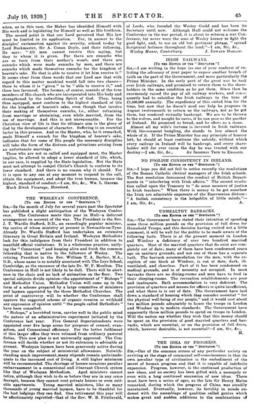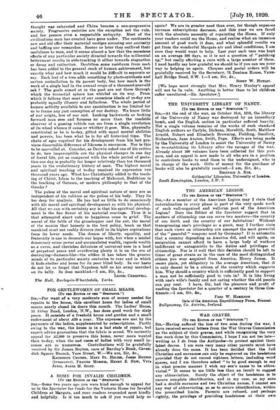THE IDEA OF PROGRESS.
(To PER EDITOR Or THE " SPECTATOR.")
Sie,—One of the common errors of any particular society on arriving at the stage of communal self-consciousness is that its own peculiar type of civilization is the embodiment of the secret of human progress and that it is capable of indefinite expansion. Progress, however, is the continued production of new ideas, and no society has been gifted with a monopoly or even with a long continued succession of new ideas. There must have been a series of ages, as the late Sir Henry Maine remarked, during which the progress of China was steadily maintained. Eventually, however, its fertility in minds en- dowed with the assemblage of qualities called genius which makes great and sudden additions to the combinations cpt thought was exhausted and China became a non-progressive society. Progressive societies are the exception not the rule, and few possess even a respectable antiquity. Most of the civilizations man has created have gone under. The continents new and old offer their material vestiges arousing our ouriosity and baffling our researches. Sooner or later they outlived their usefulness to man, and it seems almost a law that the conscious efforts of any particular society directed towards the millennial betterment results in side-tracking it either towards stagnation or decay and extinction. Doubtless some residuum from each has been added to the general stock of human achievement, but exactly what and how much it would be difficult to separate or say. Each leaf of a tree adds something by photo-synthesis and carbon assimilation to its parent body, but how much is the work of a single leaf in the annual crops of a thousand-year-old oak ? The goals aimed at in the past are not those through which the terrestial sphere has whirled on its way. From which it follows that most of our conscious ideals of to-day are probably equally illusory and fallacious. The whole period of human activity available to our examination is too limited for us to frame any just conception of our destiny. We know little of our origin, less of our end. Looking backwards or looking forward man sees and foresees no more than the roadside observer of a passing vehicle can see from a single revolution of its wheel whence it came or whither it goes. Man, physically constituted as he is to-day, gifted with equal mental abilities and powers, has been what he is for all historical time. The chain of ages required for his development from his last pre- vious discernible difference of likeness is enormous. Nor is this to be marvelled at. Consider, as Darwin asked one of his critics to do, how imperceptible are the physical changes in one day of foetal life, yet as compared with the whole period of gesta- tion one day is probably far longer relatively than ten thousand years in the evolutionary history of man. The highest moral and spiritual teaching of to-day received its expression two thousand years ago. What has Christianity added to the teach- ing of Christ, Islam to the teaching of Mahomet, Buddhism to the teaching of Gotama, or modern philosophy to that of the Greeks ?
The pulses of the moral and spiritual nature of man are as independent of his volition as the pulses of his body. They lie too deep for analysis. He has had as little to do consciously with his moral and spiritual development as with his physical. All that we can with certainty say is that his spiritual develop- ment is the fine flower of his material cravings. Thus it is that attempted short cuts to happiness come to grief. The moral of the fable of the grasshopper and the ant, the moral of the maxim that honesty is the best policy, teach us that mankind must not rashly divorce itself in its higher aspirations from its lower needs. The dream of liberty, equality, and fraternity is one to decorate our hopes with, but when a misled democracy seizes newer and accumulated wealth, regards wealth as a curse, and cherishes delusions of universal ease in a land of perpetual peace and overflowing plenty it is on the eve of destroying—Samson-like—the edifice it has taken the greater minds of its particular society centuries to rear and in which it finds shelter and home for its poor blind body. In our haste do not let us forget that Napoleon told us his army marched on its belly. So does mankind.—I am, Sir, &c., The Hall, Burley-in-Wharfedale, Yorks.
LIONEL CRESSWELL



































 Previous page
Previous page